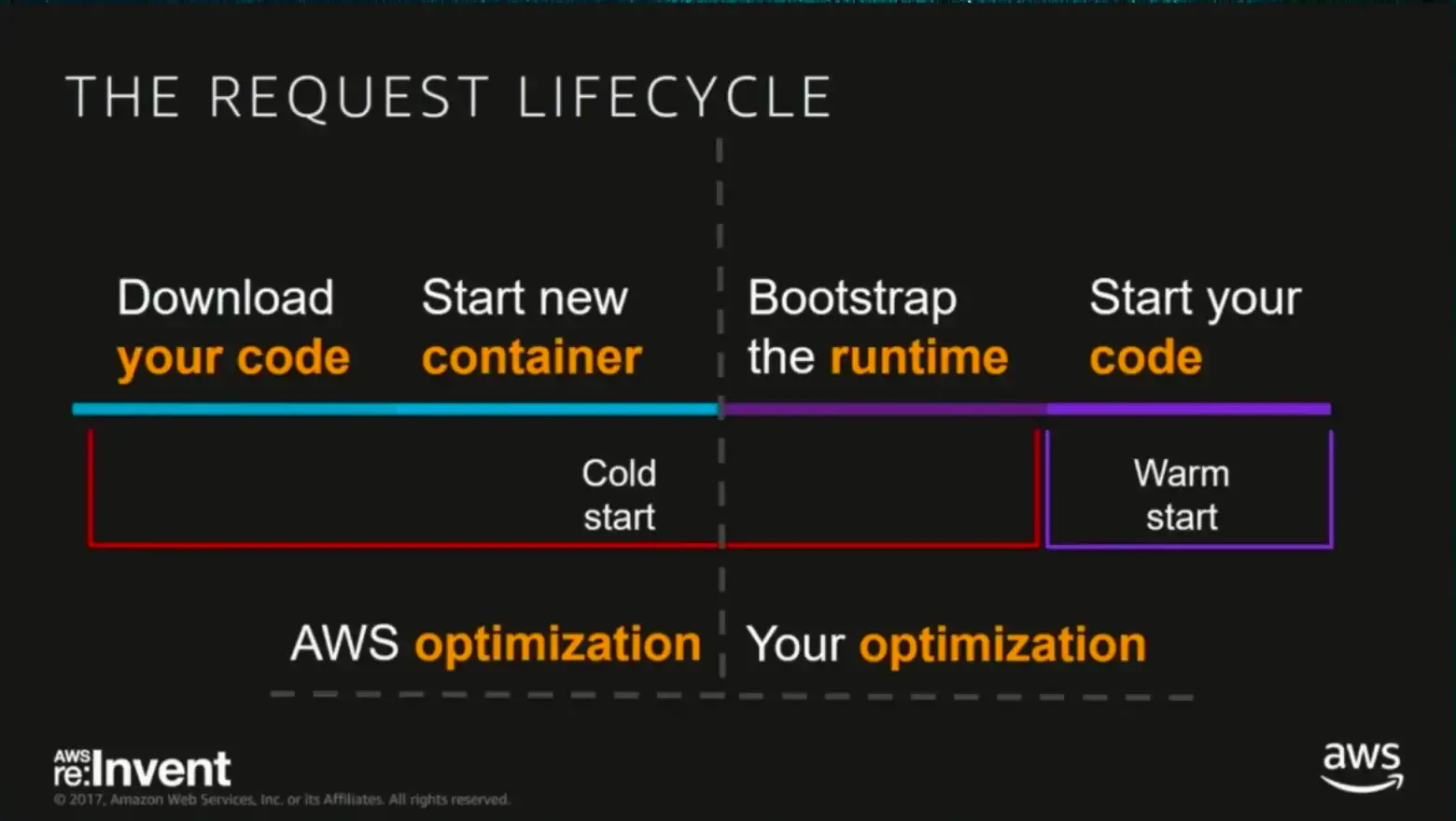Lambda Warm-up 🔥 on SST (Serverless Stack)
What is Cold Time Start?
Lambda is the serverless computing service provided by AWS. It allow the developer to avoid managing any infrastructure by working only on functions, that will executed directly by the service.
One of the biggest issue is the cold time start. Every time a query hit Lambda to run a function, a new small container need to be boot up to handle the query. This system is automatic and not customizable for developer side, but it can take some time, aka the cold start time:
 (from the article Serverless Framework: Warming up AWS Lambda to avoid “cold start”)
(from the article Serverless Framework: Warming up AWS Lambda to avoid “cold start”)
Depending on the runtime, it can vary from ~ 200ms to a few seconds (sometime 12s on Java for example!). It’s an issue if the Lambda is exposed on HTTP via an API Gateway. You don’t want to let your customer wait 12s to refresh this specific area of the page 😅
Why Warm-up is a Thing in Serverless computing?
There is multiple strategy to handle this:
- use a runtime with less cold start time (javascript, python, go…)
- use the new AWS fancy feature named SnapStart (available only for
java11runtime actually) - warm-up the function on periodic time
I will focus on the last option because SnapStart is not really a solution on SST right now (there is an open issue on aws-cdk github repository) ; and using a different runtime is not an option right now in the project 😅
To warm your function, you just have to periodically trigger it, AWS will keep a hot container so end user will less experiment a long response time. On my tests, I see the same Java endpoint going from 8.5 seconds to 1.6 seconds (not blazing fast but much more acceptable!)
How to Warm-Up in SST?
Starting Point
There is actually no built-in system for this kind of setup. On my previous stack with Serverless Framework, we were relying on the plugin serverless-plugin-warmup.
So my idea was to create a new Construct object that will be useful to warm a specific SST API.
Step by Step Guide
In your stacks/ folder, create a new constructs/ folder and create a new ApiWarmer.ts file. Provide the following in the file:
import { Api, ApiAuthorizer } from "@serverless-stack/resources";
import { Duration } from "aws-cdk-lib";
import { IRuleTarget, Rule, RuleTargetInput, Schedule } from "aws-cdk-lib/aws-events";
import { LambdaFunction } from "aws-cdk-lib/aws-events-targets";
import { Construct } from "constructs";
export interface ApiWarmerProps {
/**
* The time between each warm up.
* default to 5 minutes.
*/
readonly duration?: Duration;
/**
* The event to send to the lambda function.
* default to { source: "serverless-plugin-warmup" }
*/
readonly event?: RuleTargetInput;
/**
* The SST API Gateway to warmup
*/
readonly api: Api<Record<string, ApiAuthorizer>>;
/**
* The list of API Gateway endpoints to warm up.
* (like "GET /"" or "POST /items"")
*/
readonly routes: string[];
}
/**
* This construct is responsible for warming up the API Gateway endpoints.
*/
export default class ApiWarmer extends Construct {
constructor(scope: Construct, id: string, props: ApiWarmerProps) {
super(scope, id);
const duration = props.duration ?? Duration.minutes(5);
const event =
props.event ??
RuleTargetInput.fromObject({
source: "serverless-plugin-warmup",
});
let targets: IRuleTarget[] = [];
for (const route of props.api.routes) {
const func = props.api.getFunction(route);
if (func && props.routes.includes(route)) {
console.log(`Adding warmer to ${route}...`);
targets.push(
new LambdaFunction(func, {
event,
})
);
}
}
// Split targets into chunks of 5 (the max number of targets per rule)
const chunkSize = 5;
let chunkId = 0;
for (let i = 0; i < targets.length; i += chunkSize) {
chunkId++;
const chunk = targets.slice(i, i + chunkSize);
//create the rule
new Rule(scope, `ApiWarmerRule-${chunkId}`, {
description: "API Warmup rule",
targets: chunk,
schedule: Schedule.rate(duration),
});
}
}
}This will expose a new Construct named ApiWarmer, that take a few parameters:
durationbetween 2 warm-ups (by default 5 minutes)eventcontent to provide to the Lambda function (by default the same content sent by the serverless-plugin-warmup, easier for us 🙃)apithat will be warmed up (it must be a SST Api construct)routesthat will be warmed up: a list of routes to be warmed up, because in our specific case we don’t want to warm up all routes of the API
Then in your MyStack.ts you will be able to import and use this new construct:
import { Api } from "@serverless-stack/resources";
import ApiWarmer from "./constructs/ApiWarmer";
...
// Define your API first
new Api(stack, "Api", {
routes: {
"GET /notes": "src/list.main",
},
});
...
// Warm up the API
new ApiWarmer(stack, "ApiWarmer", {
api,
routes: ["GET /notes"],
});Under the hood it take advantage of the CDK events.Rule construct with a very simple utilisation. I have not used the SST Cron construct to avoid creating to much ressources in the stack.
To Conclude
Even if you can’t find this specific plugin or feature in SST, it’s not so complex to build around with the power of CDK. I think this is the greatest advantage of this framework 😍. To continue your journey don’t leave before reading the following around SST!